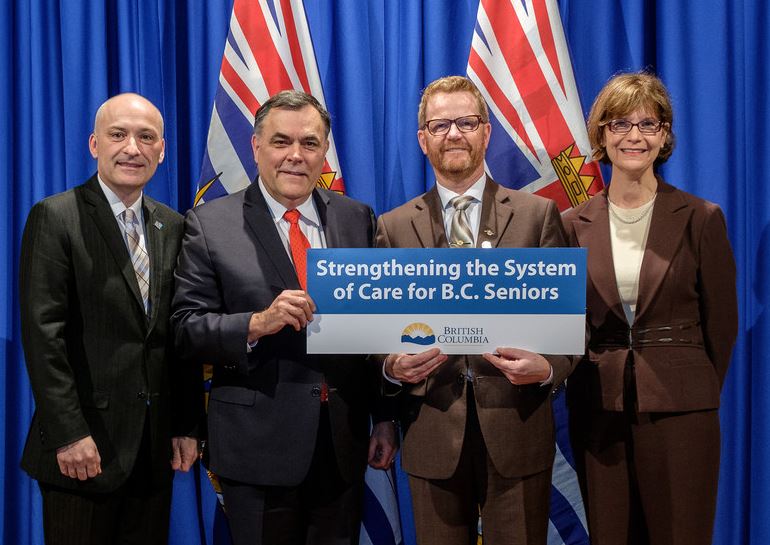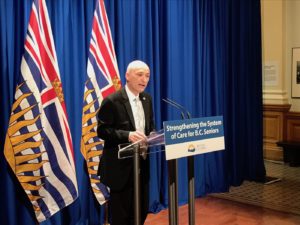Burnaby, BC [March 9, 2017] – Today, the B.C. Government and the Minister of Health announced significant funding investments in seniors care, and an Action Plan drafted by Parliamentary Secretary for Seniors Dr. Darryl Plecas (the “Plecas Plan”). Multiple items have been addressed in a BC Care Providers Association (BCCPA) 4-pillar plan released in January featuring recommendations to strengthen seniors care in British Columbia.
Plecas Plan Highlights
- New investments in home and community care include $700 million over the next 4 years — this is due in part to the recent signing of the Federal-Provincial Health Accord. Included in the overall funding is a planned increase of $200 million by 2020/21 to the base budget for regional health authorities to fund home and community care
- Residential care providers including contracted providers will be given funding to move to an average of 3.36 direct care hours by health authority – this will include the hiring of over 1,500 new frontline staff including nurse practitioners, registered nurses, registered psychiatric nurses, licensed practical nurses, and health care aides
- BCCPA will be given $10 million to address the immediate need for the purchase of equipment such as wheelchairs and ceiling lifts for our members and other publicly-funded care providers
- The government in partnership with organizations like the BCCPA will develop and fund a comprehensive recruitment and retention strategy to ensure we have the workforce that meets the demands of our rapidly ageing population
- A commitment to increase home support services and hours, and redesign services to improve ease of home care access and the vision of keeping people at home longer
- By July 2017, introduce a standardized definition of “direct care hours” across the province
- By 2018, move toward a more open and transparent province-wide standard residential care funding model, with a lens to incorporate resident complexity (using RUGs and case mix index from RAI assessments), quality of care and flexibility
- Quality of life will be supported through greater access to allied health care staff such as recreational therapists, occupational therapists and dieticians
“It’s great to see the BC Government responding to so many of the recommendations we put forward earlier this year,” says Daniel Fontaine, BCCPA CEO. “Whether it’s the new $10 million in funding to cover equipment purchases or a commitment to increase direct care hours, our efforts to affect change in this sector have made a difference.”
“Seniors are an important part of the fabric that makes up our communities, and often some of the most vulnerable,” said Health Minister Terry Lake. “This investment helps ensure access to quality services across the continuum of care, from supports in their homes to residential care. No matter how complex a person’s needs are, we want to ensure they get the most appropriate care that best enhances their quality of life.”
To help meet the increase in hours and to further improve the quality of care, the province plans to work with the health authorities and industry to hire about 1,500 additional staff, an estimate based on a 2009 provincial staffing framework, including health-care assistants, nurses, occupational therapists and physiotherapists. In addition, specialized community service programs operated by health authorities will be introduced in communities across the province to help proactively support the health of seniors with complex medical conditions such as frailty, dementia, multiple chronic illnesses or end-of-life care needs.
“We are very pleased the B.C. Government is responding to calls from the province’s seniors care providers, and will implement a large number of BCCPA’s recommendations to help strengthen seniors care delivery in British Columbia,” says Fontaine. “By making these significant investments in home and community care, B.C. seniors and their families can have greater confidence that the right care will be there, at the right time, and in the right place.”
“Today is a great day for the seniors of B.C., and we are delighted with this funding announcement,” says Karen Baillie BCCPA board president. “I would like to acknowledge the leadership by our CEO and the work of our board in partnership with the Ministry of Health, Dr. Terry Lake, and Dr. Darryl Plecas.”
To better protect some of the most vulnerable seniors, government will also bring into force by April 2018 part three of the Health Care (Consent) and Care Facility (Admission) Act, as recommended by B.C.’s ombudsperson. This legislation will require health authority staff and care facility operators to get consent for admission to a care home, including extending protections for adults who may not have the capacity to make such decisions. Under part three, if a person is assessed as incapable of consent, then a personal guardian or substitute decision-maker (usually a family member or close personal friend) would have to give consent on the person’s request. If no one is available or qualifies, then the public guardian and trustee may appoint someone, including one of their staff. Substitute decision-makers must act in the person’s best interests – consulting with the person and their family, and considering previously expressed wishes – to determine whether admission to the residential care home would be beneficial.
-30-
Media Contact
Therese Guieb
Communications and Stakeholder Relations Coordinator
tguieb@bccare.ca
604-736-4233, ext 235
Quick Facts
- Over $2.9 billion was invested in home and community care in 2016 throughout the province, an increase of over $1.3 billion from 2001.
- B.C. has 31,965 publicly subsidized residential care, family care home beds, assisted living and group home beds – an increase of over 6,500 beds since 2001.
Video
Links
- Government of B.C. Ministry of Health news release
- Plecas Plan to Strengthen Home and Community Care for Seniors
- Residential Care Staffing Review








